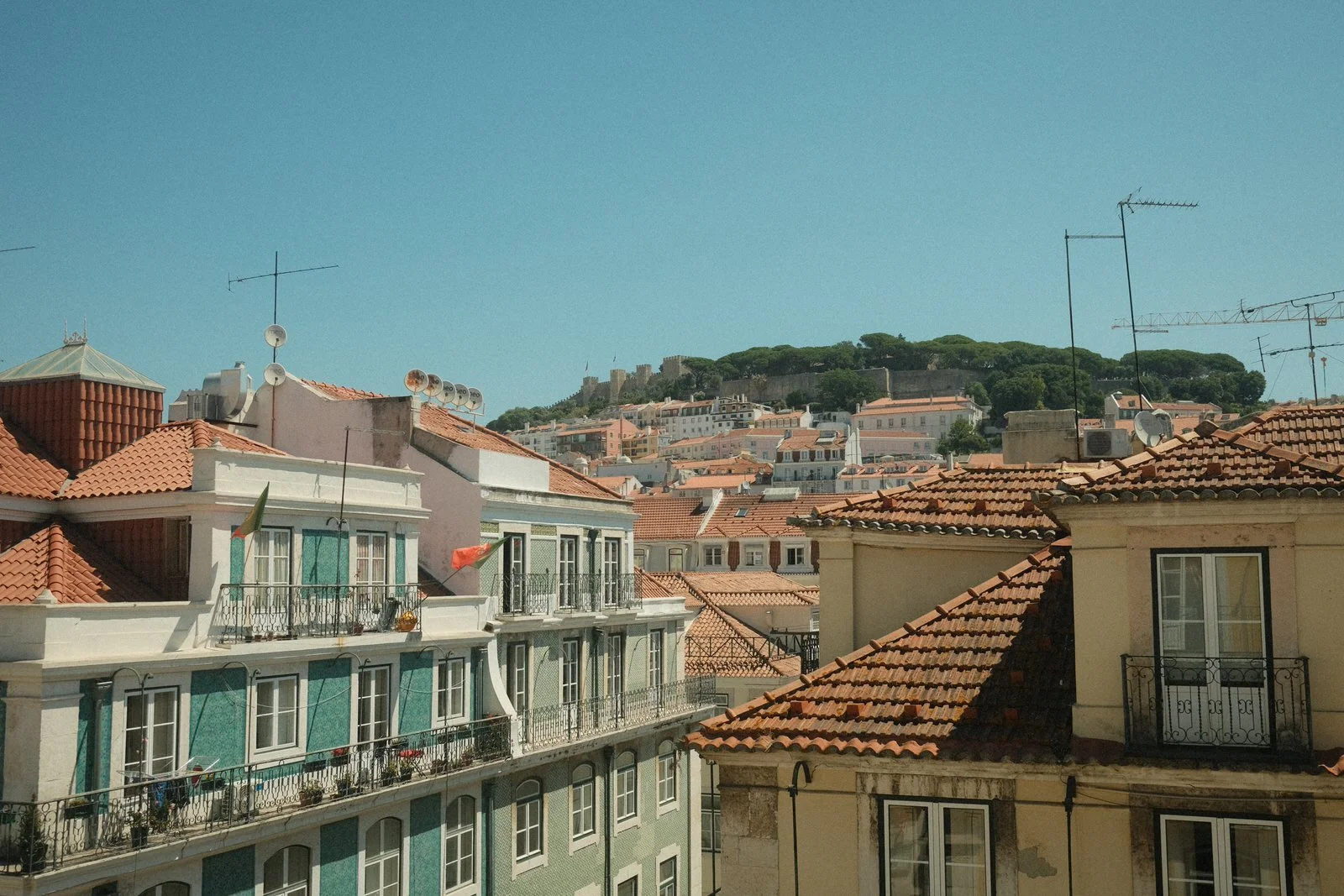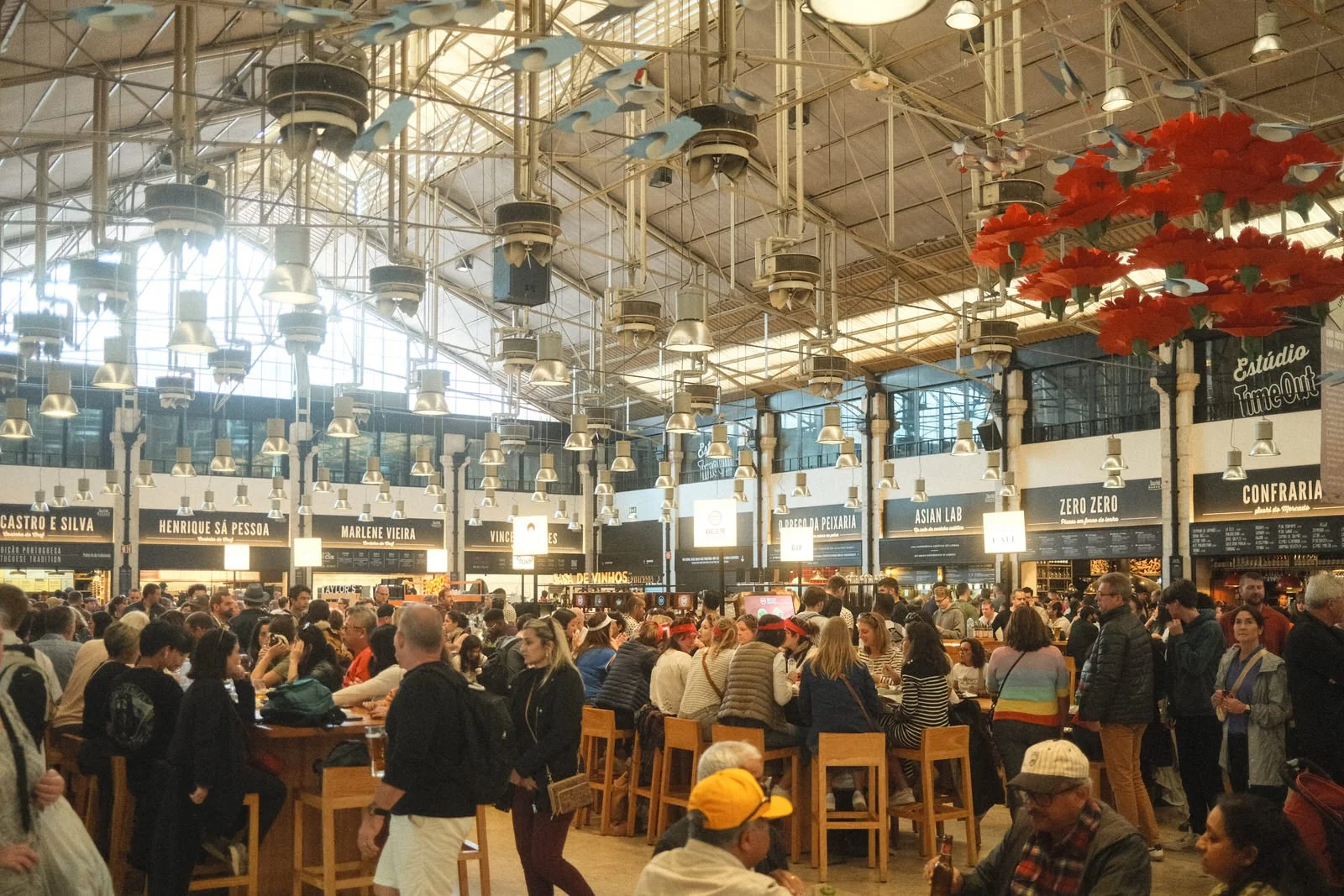The Ultimate Lisbon Student Accommodation Guide
The view from Visto do Castelo Suites apartments
Firstly, let us begin by congratulating you for choosing such a beautiful city for your studies. Having had the pleasure of experiencing ‘Lisbon life’ first-hand ourselves, we can personally vouch for the city’s safety, quality of education, amazing cuisine - and unbeatable sunset view points.
In this Ultimate Lisbon Student Accommodation Guide we will review the best student apartments in Lisbon across all 3 price categories - budget, mid-range - and of course, luxury.
So, whether your budget is €100, €1,000 or €10,000 per week - this guide will have you covered.
We will also explore Lisbon’s different neighbourhoods, evaluating their unique characteristics and suitability for students.
So, without further a do, let’s get started. Feel free to navigate to the most relevant section for you below, or simply scroll down to continue on.
The famous instagram spot of Elevador da Bica
About the City of Lisbon
Overview
Lisbon is the capital city of Portugal, and is renowned for its rich history, vibrant culture, and stunning architecture. Nestled along the Tagus River, the city boasts a unique blend of traditional and contemporary influences, characterised by its cobblestone streets, colourful tiles, and the iconic yellow trams.
According to the Portuguese National Institute of Statistics, Lisbon receives about 20 million visitors annually, and is one of the most popular cities in Europe. The climate is generally mild, making it an attractive destination year-round - but it can really heat up in summer!
Lisbon is nicknamed ‘the city of the 7 hills’, and we can assure you that it lives up to this label! You will get fit VERY quickly just walking around from place to place. If walking is not your thing, Uber and Bolt are cheap and convenient - and there is a strong eBike and eScooter culture here, which you can top up via smartphone apps.
A strong recommendation from us is to check out the city's many viewpoints, or ‘miradouros’, as they say in Portuguese. These places offer breathtaking panoramic views, and are excellent places to have a drink during the sunset. Our personal favourites are Miradouro de Santa Luzia and Miradouro da Graça.
The amazing Miradouro da Graça viewpoint
Student life
As of the latest available data from 2022, Lisbon is home to approximately 60,000 students enrolled in higher education institutions (Source: European Commission, Education and Training Monitor 2022).
This figure includes both Portuguese and international students attending universities and polytechnic institutes across the city. Institutions such as the University of Lisbon, Lisbon Polytechnic Institute, and Universidade Nova de Lisboa contribute significantly to this student population.
International students, in particular, are increasingly drawn to Lisbon for a myriad of reasons that enhance their academic and personal experiences. With sunny weather prevailing for most of the year, students can take advantage of outdoor activities, picturesque parks, and stunning viewpoints overlooking the Atlantic Ocean.
Lisbon’s famous tiles - a familiar sight in areas like Alfama
Culture
Lisbon is very much a city of artistic expression, with numerous galleries, street art, and cultural festivals that celebrate both traditional and contemporary works. The distinctive azulejos, or ceramic tiles, adorn the facades of buildings, showcasing intricate designs that tell the story of Lisbon’s past.
Cultural attractions abound, including the historic Belém Tower, the Jerónimos Monastery, and the modern MAAT (Museum of Art, Architecture, and Technology). Fado music, with its soulful melodies and poignant lyrics, is deeply rooted in the city's identity, often performed in intimate venues where locals and tourists alike gather to experience this captivating art form.
The neighbourhood of Chiado
Lisbon's neighbourhoods, each with its unique charm, reflect the city’s eclectic nature. From the historic Alfama and its winding streets to the trendy Bairro Alto with its bustling nightlife, the city offers a vibrant atmosphere that is both welcoming and stimulating (more about Lisbon’s neighbourhoods later).
Festivals throughout the year, such as the Festas de Lisboa, bring the community together, celebrating local traditions with music, dance, and culinary delights.
The harmonious blend of the old and the new in Lisbon fosters a culture of innovation, encouraging both locals and expatriates to contribute to its ever-evolving narrative. This dynamic culture, underscored by a warm hospitality and an appreciation for the arts, makes Lisbon an enticing destination for students and creatives from around the world.
The Baixa district - in the heart of Lisbon
Safety
Lisbon is considered one of the safest capitals in Europe, boasting a low crime rate and a welcoming atmosphere for both residents and visitors. The city benefits from a strong police presence and well-lit streets, contributing to a sense of security, especially in popular tourist areas.
The city's friendly locals and innovative spirit contribute to an inviting atmosphere that welcomes visitors to experience both its traditional roots and modern flair.
While petty crimes such as pickpocketing can occur, particularly in crowded locations, awareness and common-sense precautions can significantly mitigate risks. Compared with cities like London and Paris, Lisbon is extremely safe - making it an attractive destination for parents seeking complete peace of mind.
Accommodation scams
Accommodation scams targeting students in Europe have become increasingly prevalent, particularly in major cities that attract a large number of international students. One common scam involves advertisements for rental properties that do not exist.
Scammers often use online platforms to post appealing listings, complete with attractive photos and enticing rental prices. When students express interest, they are asked to send a deposit or first month's rent before even visiting the property. Once the payment is made, the scammer disappears, leaving the student without accommodation and their money stolen.
Unfortunately Lisbon is not immune to such scams. There is some guidance here about avoiding the most known ones, but we also recommend doing the following:
Check the provider’s Google or Trust Pilot Reviews
Google ‘Company X reviews' - see what others are saying online
Check social media to see their account’s activity & legitimacy
Be careful when making payments abroad
Call or FaceTime the company to check the legitimacy of the apartments / and or company
Students (and parents) may find themselves in precarious situations, pressured to make decisions quickly to secure what seems to be a desirable living arrangement. Our advice is to not be hasty in your decision-making, and follow the steps outlined above.
Lisbon Area Guide
Now we’ve got the serious stuff out of the way, it’s time to explore the characteristics of Lisbon’s various neighbourhoods, in alphabetical order…
The LX Factory in Alcantara
Alcantara
Alcantara is an up-and-coming Lisbon district known for its stunning riverside views and a rich blend of historical and modern architecture. Our team fondly dubbed it the ‘Shoreditch of Lisbon’, as it features a healthy blend of cafes, restaurants, and cultural venues - such as the Instagram-famous LX Factory. It’s an ideal location for students looking to balance their academic pursuits with a lively social scene.
One of Alcantara's highlights is its stunning waterfront location. The riverfront area features picturesque views, making it an ideal spot for leisurely strolls or bike rides. The Alcântara Docks are home to numerous bars and restaurants, perfect for enjoying a meal or drink while watching the sunset over the river.
Alcantara boasts several cultural attractions, including the MAAT (Museum of Art, Architecture and Technology), which showcases contemporary art and thought-provoking exhibitions. The nearby Museu Nacional de Arte Antiga offers a glimpse into Portugal’s rich artistic heritage, making it a must-visit for art enthusiasts.
Closest universities & campuses: Faculty of Architecture (University of Lisbon), School of Agriculture (University of Lisbon), Lisbon School of Economics and Management and IADE Creative University.
























Alfama
As the slideshow above illustrates, Alfama is one of the oldest and most charming neighbourhoods in Lisbon - a living testament to the city’s past. It is characterised by narrow, winding streets and vibrant atmosphere. The entire neighbourhood is adorned with colourful tile facades, traditional Fado music venues, and picturesque viewpoints that offer breathtaking vistas of the Tagus River. Indeed, it is one of Lisbon's only areas where you'll still find medieval structures. It’s old!
If you’ve spoken to anyone that has been to Lisbon before, we’re betting they told you that Alfama was one of - if not - the favourite part of their visit. Things not to miss here include São Jorge Castle, Lisbon Cathedral (Sé de Lisboa), Miradouro de Santa Luzia, Fado Museum and St. Anthony’s Church (Igreja de Santo António).
But it’s not just the things to see and do that make Alfama special, it’s the feeling the area gives you simply just walking around. The old-town atmosphere is special. Locals, tourists, expats, and students alike love the labyrinthine alleys lined with quaint cafes, artisanal shops, and local markets. It really is one of our favourite parts of Lisbon, inviting exploration of its unique culture and heritage.
While there aren’t too many university campuses in the area, Lisbon is a well connected city - and getting around is not a problem. We wouldn’t let this put you off from basing yourself here, as Alfama more than makes up for it with its charismatic charm.
The accommodation here largely consists of private apartments to rent, with little (if any) cheap student blocks. If your budget permits, we recommend this area as a priority!
Closest universities & campuses: ISPA (Institute of Applied Psychology) and NOVA Medical School.
Jerónimos Monastery, Ajuda area of Lisbon
Ajuda
Ajuda is characterised by its blend of historical significance and modern vibrancy. Nestled near the banks of the Tagus River, Ajuda features notable landmarks such as the Ajuda Palace, Parque dos Moinhos de Santana and Jerónimos Monastery shown above.
The area is relatively quiet compared to other parts of Lisbon, making it an ideal spot for students seeking a peaceful yet engaging environment. Streets are lined with a mix of traditional Portuguese buildings and contemporary residences, creating an inviting atmosphere. Local shops, cafes, and restaurants offer a taste of authentic Portuguese cuisine, while nearby attractions like the Botanic Garden provide ample opportunities for relaxation and leisure.
Residing in Ajuda presents a mix of advantages and drawbacks. While certain sections may seem neglected and less attractive, this neighbourhood is one of the most cost-effective and genuine places to call home in Lisbon. Its close proximity to Alcântara and Belém enables residents to conveniently stroll to these vibrant areas while appreciating the local allure that Ajuda offers.
Closest universities & campuses: ISPA (Institute of Applied Psychology) and NOVA Medical School.
Elevador da Bica, Bairro Alto
Bairro Alto & Principe Real
Bairro Alto is a sprawling neighbourhood known for its great views, artistic spirit and lively atmosphere. It exudes a bohemian charm that attracts young professionals and students alike. The area has someone of Lisbon’s best nightlife, with numerous venues that come alive after dark.
It is almost impossible to visit Lisbon properly and not pass through parts of Bairro Alto - especially as the city’s delicacy Pastéis de nata are best found at Manteigaria.
While the atmosphere is lively, Bairro Alto also offers spaces for relaxation, such as small parks and trendy rooftop terraces with stunning views of the city. We love Miradouro de São Pedro de Alcântara. Other must-do’s in Bairro Alto include walking up and down Rua da Rosa - one of the most notable streets in Lisbon lined with stylish boutiques, local shops, and cafes.
The famous Elevador da Bica is a historic funicular railway located here. Constructed in 1892, it serves as a vital transportation link, connecting the steep streets of Rua da Bica to the higher elevations of Bairro Alto. The funicular is noted for its charming yellow carriages, which have become an iconic symbol of the city. Today, it serves more as an Instagram spot than mode of transport!
Principe Real just north is slightly less crowded and more residential, but still another trendy district celebrated for its charming blend of traditional and contemporary influences. Visitors can explore lush gardens, such as the picturesque Jardim do Príncipe Real, which offers a serene escape amid the city’s hustle and bustle, as well as a lively farmers' market on Saturdays. The area is lined with elegant 19th-century mansions, unique boutiques, and stylish cafes, making it a perfect destination for leisurely strolls. Additionally, Principe Real is renowned for its diverse nightlife, featuring a variety of bars and clubs that cater to eclectic tastes, ensuring an unforgettable experience in this upscale quarter of the city.
Closest universities & campuses: Lisbon School of Economics and Management, IADE Creative University, University Autónoma de Lisboa & Nova Medical School.
The Estádio da Luz - officially named Estádio do Sport Lisboa e Benfica
Benfica
While it’s not a particularly sexy area compared to the likes of Alfama and Bairro Alto - Benfica is home to several educational institutions and sports facilities that contribute to a convenient and enjoyable student environment.
The area offers an appealing blend of green spaces, cultural landmarks, and a strong sense of community. Residents here love the spacious parks, such as the Parque da Quinta das Conchas, which provide a serene escape from the city's hustle and bustle. These green areas encourage outdoor activities and social gatherings, making them ideal for both relaxation and recreation.
One of the best things to do in Benfica is visit The Estádio da Luz - the home of Portuguese football team Benfica. They regularly fight it out for the league title with Porto and rivals Sporting Lisbon, and usually qualify for the Champions League - so students living here may want to invest in a season ticket!
Transport convenience is another hallmark of living in Benfica, with easy access to the Lisbon Metro and bus services ensuring that both the city centre and other neighbourhoods are within reach. This connectivity is especially beneficial for students, allowing them to explore the broader cultural and academic landscape of Lisbon.
Closest universities & campuses: Instituto Politécnico de Lisboa, AESE Business School and Católica Lisbon School of Business & Economics
The famous Time Out food market in Cais do Sodre
Cais do Sodré
Cais do Sodré is multifaceted and wonderful. It houses Lisbon’s main ferry terminal that connects to Cacilhas (across the river). It also has a train and metro station, as well as a major bus stop. This ease of travel is particularly beneficial for students who need to access various educational institutions or explore different areas of Lisbon.
One such place is the picturesque coastal town of Cascais. The train journey from Cais do Sodré to Cascais offers a scenic and pleasant experience along the Portuguese coast, taking approximately 40 minutes. Cascais is renowned for its stunning beaches, vibrant marina, and charming historic centere - the perfect place to spend your weekends away from studying!
Not only is CDS a transport hub, it’s also a vibrant nightlife and dining spot. The famous Time Out Market and Rua Nova do Carvalho (commonly referred to as Pink Street) are located here. Our favourite food spots are Amaru - Peruvian Street Lab, Lupita Pizzeria and the tacos at La Malquerida.
It is important to note that Cais do Sodré is a bustling area, which can lead to higher noise levels - especially during weekends. However, we think the vibrant atmosphere and transport connections outweigh any potential negatives.
Closest universities & campuses: Lisbon School of Economics and Management, IADE - Creative University, and University of Lisbon’s various campuses
Campo de Ourique has plenty of green space to relax & recharge
Campo de Ourique & Campolide
Characterised by tree-lined streets and residential atmosphere, this area offers a more localised feel compared to some of the more tourist-heavy parts of the city. Students living in Campo de Ourique benefit from green space (our favourite is Jardim da Estrela), an array of local shops, quaint cafés, and artisan markets at their doorstep.
The Mercado de Campo de Ourique is a popular spot for both locals and students, and provides an excellent venue for fresh produce, gourmet foods, and social gatherings. Amélia Lisboa will be your go-to coffee and brunch spot, with smoothie bowls to die for.
Accessibility to education is another significant advantage. Campo de Ourique is strategically located near several universities and colleges, allowing students to easily commute. Public transport options are abundant, including trams and buses, connecting residents to the broader Lisbon area.
Safety and tranquillity are other notable features of Campo de Ourique, providing a peaceful environment conducive to academic focus while still retaining access to Lisbon’s nightlife and entertainment.
Closest universities & campuses: Lisbon School of Economics and Management, IADE - Creative University, and University of Lisbon’s various campuses
The University of Lisbon, Campo Grande
Campo Grande & Palma de Baixo
Campo Grande & Palma de Baixo serve as the central hubs for higher education in Lisbon, hosting many of the city's most prestigious universities. Here you can find the following campuses:
ISCTE - University Institute of Lisbon
The University of Lisbon
Universidade Lusófona
Catholic University of Portugal & Católica Lisbon School of Business & Economics
AESE Business School
The area boasts a lovely green park - Jardim Mário Soares, where there are Padel courts, gyms, climbing walls, ponds - and even a restaurant. Picture towering trees, flowering bushes and inviting park benches. This park provides the perfect setting for relaxation and rejuvenation for students of the above universities.
However - we don’t really recommend this neighbourhood as a priority for students - especially those just staying for 1 semester or 1 year. This is because residents here are quite isolated away from all of the best parts of the city. Chances are if you are only visiting for a certain amount of time, you will want to make the most of it - and be based in a more ‘fun’ part of the city, like Chiado or Alfama. Of course, everyone has different preferences - but this is just worth noting.
The wonderful Carcavelos beach, west of Lisbon
Carcavelos
Visit Carcavelos, a pleasant seaside town to the west of Lisbon that's mostly famous for its fine wine and long sandy beach.
Carcavelos is famous for its long, golden-sand beach, which makes it a popular destination for surfers and beachgoers. Living here means you can easily access the beach for walks, sunbathing, or water sports. The beach is one of the key aspects of the town’s charm, and many residents enjoy a healthy, outdoor lifestyle.
Nova School of Business & Economics (Nova SBE) is located in Carcavelos - and is a prominent business school offering undergraduate, master’s, and Ph.D. programs in economics, management, and finance. It is quite popular with internationally, attracting around 1500+ overseas students every year.
While Carcavelos has a more relaxed, suburban vibe, it's just a short train ride (about 20-30 minutes) to Lisbon. This makes it an attractive place for those who work or study in the capital but prefer to live in a quieter environment. The easy commute means you can enjoy the best of both worlds: a peaceful home life near the ocean, with easy access to Lisbon’s cultural and professional opportunities.
Closest universities & campuses: Nova SBE - and as previously mentioned - many other universities are just a relatively short commute away.

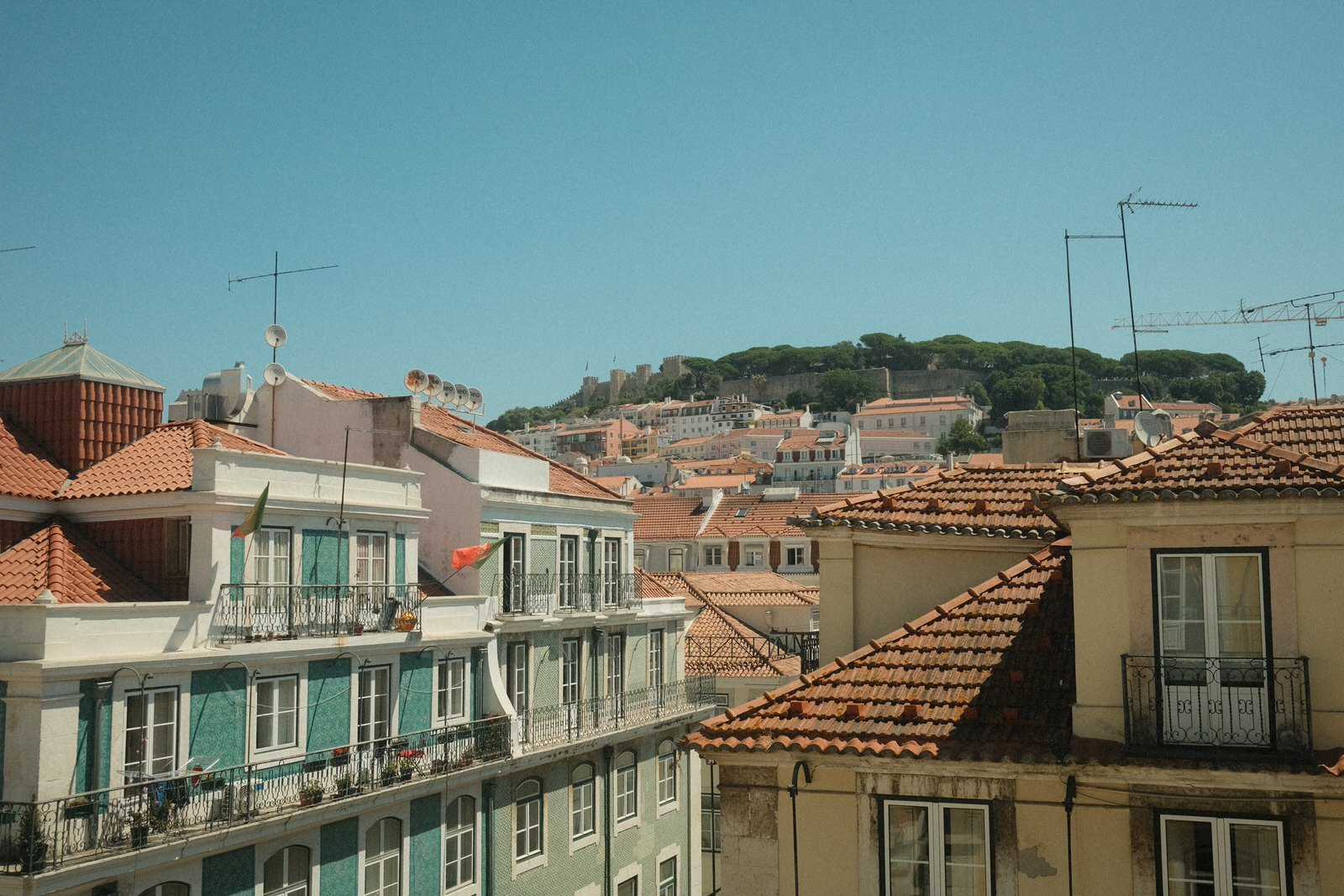


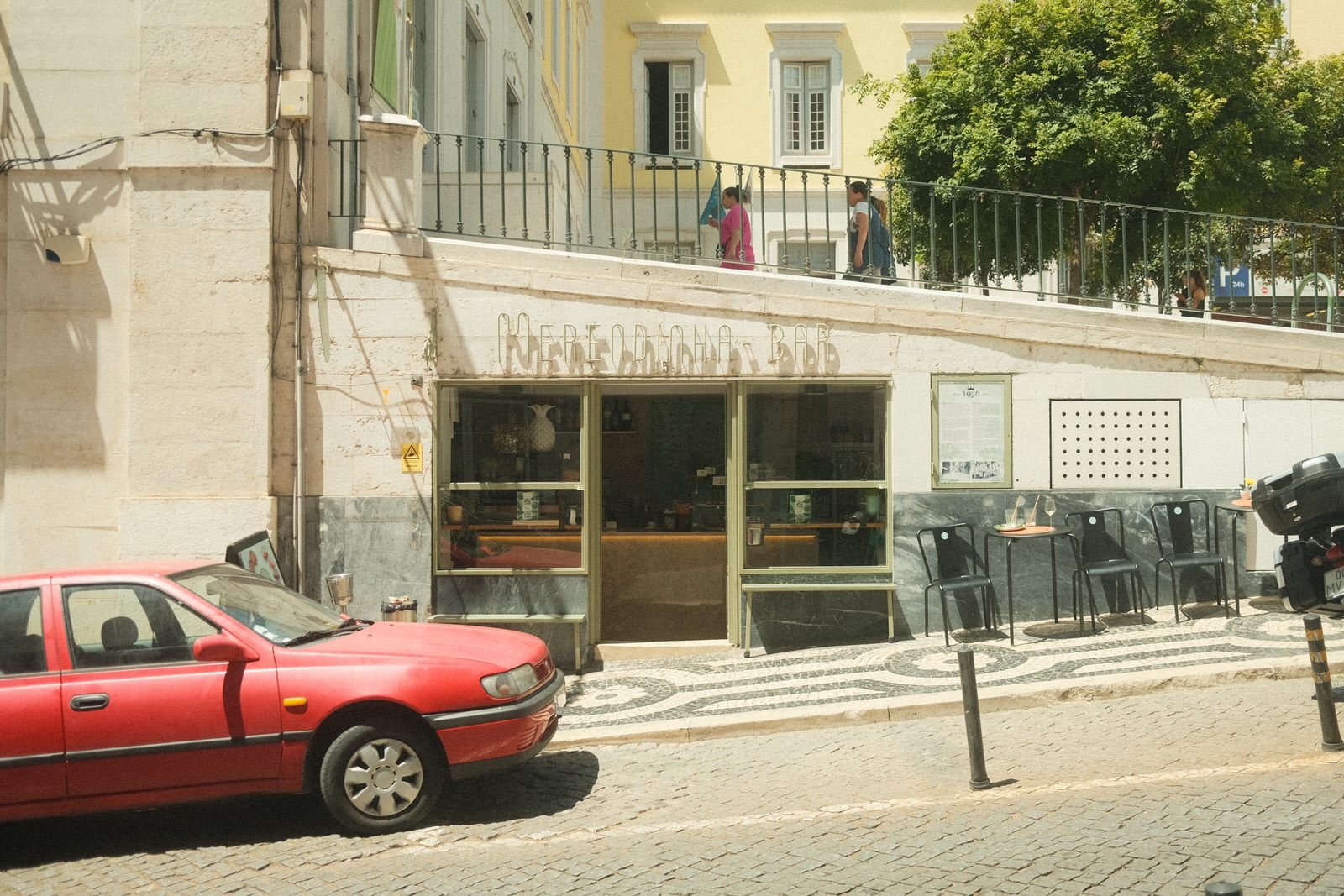




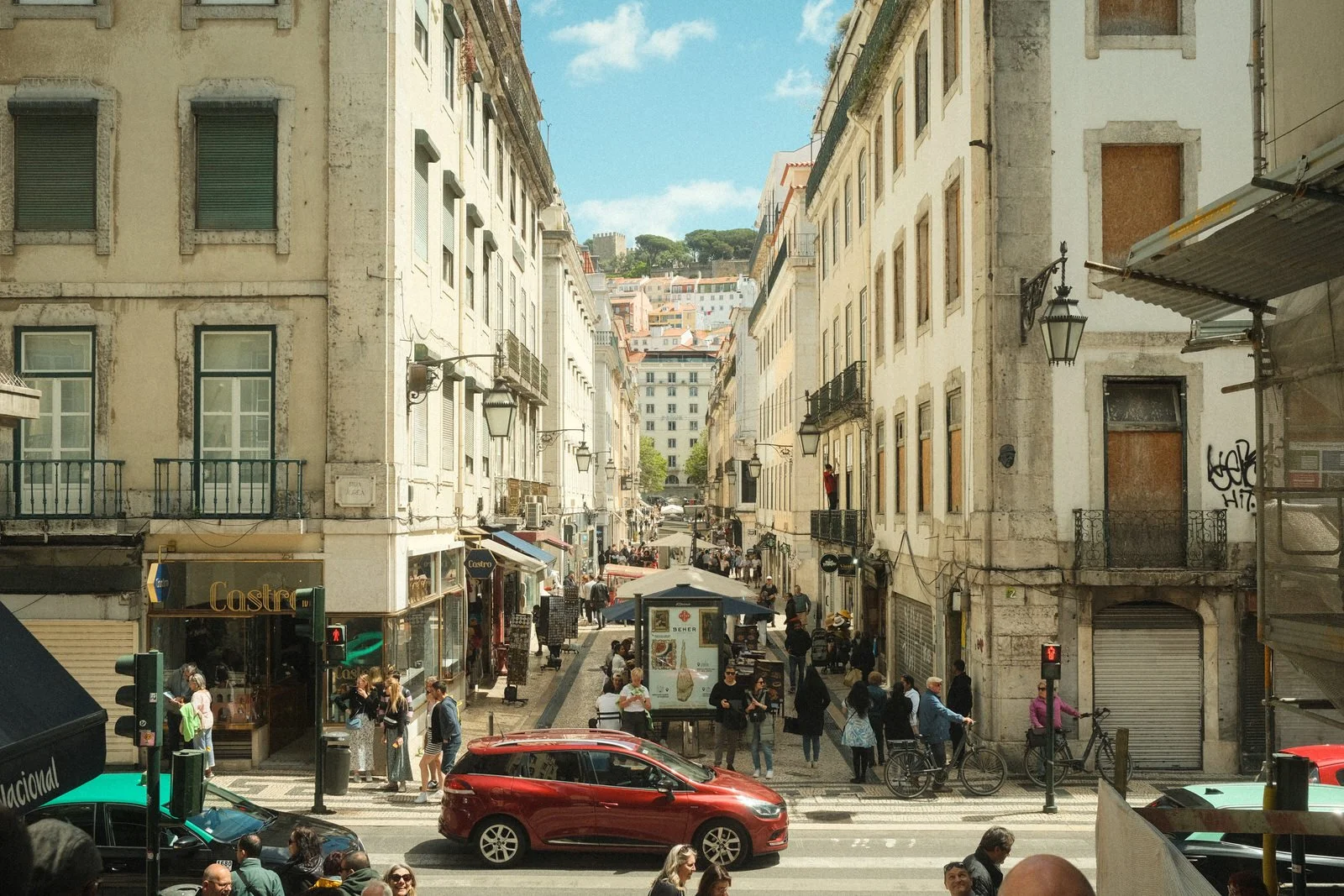






Chiado & Baixa de Lisboa
Baixa de Lisboa & Chiado sit next to each other, flanked either side by Alfama to the East and Bairro Alto to the West. We decided to put them together as it is quite hard to depict where one ends and the other starts.
Much like Alfama - this part of Lisbon deserves it’s own slideshow of images, and is arguably the busiest part of Lisbon. The bustling streets here are lined with designer boutiques, upscale restaurants, and traditional cafés.
Chiado features grand buildings that house some of the city’s most important cultural establishments, including theatres, museums, and galleries. Residents here feel the pulse of Lisbon's artistic heritage. Notably, the iconic "Café A Brasileira," once frequented by the poet Fernando Pessoa, invites residents to indulge in a rich coffee culture that is central to Portuguese life. Other things not to miss include the Chiado Museum, the ruins of the Carmo Convent, Chiado district's shops and the views from Miradouro de São Pedro de Alcântara.
The Praça do Comércio and Arco da Rua Augusta in Baixa de Lisboa are stunning examples of Portuguese neoclassical architecture. Strolling around the streets here is a popular past time, with various shops, boutiques, and traditional Portuguese stores at every turn.
Additionally, these areas are well-connected by public transportation, making it convenient for students to commute to academic institutions across the city. Living in Chiado means being close to universities and colleges, reducing travel time and increasing the time available for studying and engaging in extracurricular activities.
Security is another crucial factor. Chiado is known for its safety, providing peace of mind for both students and their families. The presence of luxury apartments that cater specifically to student needs enhances this feeling of safety and comfort.
Closest universities & campuses: Lisbon School of Economics and Management, University Autónoma de Lisboa, NOVA Medical School - and pretty much any other Lisbon university due to the excellent transport connections














Marques de Pombal / Avenida
Marquês de Pombal encapsulates the famous street of Avenue da Liberdade leading up to massive roundabout and park named ‘Parque Eduardo VII’. While this is primarily a district for luxury shoppers and business folk, it has grown into a popular area for students seeking private rentals.
The gallery above gives a good representation of MdP’s visuals - lots of greenery and historic establishments. The aforementioned Eduardo Parque is perfect for a morning jog - or an afternoon picnic spread with classmates.
Access to public transportation is also significant advantage in Marquês de Pombal. The metro station and bus services provide convenient connections to major universities. For example, the University of Lisbon can be accessed in just 15 minutes from here.
Closest universities & campuses: University of Lisbon, Iscte - University Institute of Lisbon, Universidade Lusófona - Centro Universitário de Lisboa, Católica Lisbon School of Business & Economics & many other campuses in the Campo Grande area
Green street in Santos, Lisbon.
Santos
Santos is an increasingly popular neighbourhood in Lisbon, located along the city's historic waterfront and close to several cultural and commercial hubs. It has a reputation for being a trendy, artsy area with a youthful vibe, but also a mix of history and modernity.
Santos is also home to a cluster of our favourite cafe and brunch spots - namely Yellow Lemon Coffee & Wine Cafe, Liberty: brunch coffee & wine and the Santos location of Fauna & Flora. Many new cafes and concept stores have opened in recent years, contributing to the area’s bohemian charm. If you appreciate a lively and creative atmosphere, Santos really could be an ideal place for you.
The area just north of Santos is called Jardim Da Burra, which is also very nice, so you can’t really go wrong with this part of the city.
Closest universities & campuses: IADE, ISEG (Lisbon School of Economics and Management) are situated in Santos!
And finally…a video
Here’s a short video we shot in & around Lisbon during one of our team’s trips to visit our luxury accommodation.
Summary
In summary, there are plenty of suitable areas for students to live in Lisbon - maybe even some not mentioned above. The point is each will have a few key points of difference that will prove to be the deciding factor.
For students that simply want the ‘best area’, they might look at Alfama and Chiado as opposed to the areas further north towards campuses. However, students prioritising a short walk to university will want to actually live near the campus.
Budget university dorm in Lisbon
Cheap Accommodation Options
Types: University dorms, shared apartments, homestays, PBSA blocks (purpose-built student accommodation)
Approx Pricing: €75-200 euros per week (after bills)
Students seeking Lisbon’s cheapest accommodation options will find most joy looking on their university’s website to begin with. If there is no availability, PBSA blocks and other accommodation providers of shared apartments will be your next best bet.
Cheaper student accommodation tends to be located outside the city’s most popular areas, which are usually expensive. Our advice when seeking budget accommodation is to always consider your proximity to public transportation and university campuses. Make sure the journey to your university campus is feasible.
Budget accommodation options in Lisbon usually come in the form of shared apartments with communal living spaces. They are a popular choice for students who cannot afford - or don’t want to rent a full apartment on their own.
In a shared apartment, you’ll usually have your own bedroom but share communal spaces like the kitchen and living room. This option provides a great balance of privacy and social interaction, making it ideal for students who enjoy living with friends or meeting new people while still having their own space.
WARNING: Please be careful when looking in this category. Pay great attention to online listings where rooms to rent are very cheap, as sometimes they are disguised as the aforementioned accommodation scams. In our experience if the price seems to too good to be true, chances are, it’s a scam.
Our Advice
We recommend reliable accommodation platforms like Uniplaces and spotahome. They have a good stock of apartments at great rates in this pricing category.
With the cheapest accommodation options, it’s important to start your search as soon as you receive your acceptance letter. The earlier you start, the more options you'll have. Join social media groups or forums for international students in Lisbon. Current students can provide valuable insights and recommendations for available housing.
Fixed apartment rentals in Lisbon
Mid-Range Accommodation Options
Types: co-living spaces, hostels, budget hotels, private rentals on fixed contracts
Approx Pricing: €250-400 euros per week (after bills)
Students seeking mid-range accommodation in Lisbon have various options to consider that offer a balance between comfort, amenities, and cost. Much like the budget options, it’s best to start your search early in this category as the best apartments will be gobbled up first.
When looking at renting apartments in Lisbon be sure to double-check they come furnished, as sometimes pictures are just for show - and the apartments themselves are actually offered unfurnished!
Whilst we haven’t experienced them for ourselves, for mid-range budgets we suggest taking a look at Yon Living. They look great - and we’ve heard good things.
Our Advice
If possible, plan a trip to Lisbon before your move to visit potential accommodations. This will allow you to see the place in person and get a feel for the neighbourhood. Understanding your lease is also essential - pay attention to terms regarding rent, furnishings, utilities, maintenance responsibilities, and any house rules.
Private, modern apartments to rent in Lisbon
Luxury Accommodation Options
Types: Hotels, private apartments with flexible contracts - long & short stays available
Approx Pricing: €500-€2,000+ euros per week (after bills)
Students with bigger budgets seeking superior stays for their studies have a good choice of luxury accommodation options. Typically, options in this category will be fully-furnished and equipped - with things like WIFI already set up, and occasionally housekeeping services included.
Other premium amenities could include on-site receptions, fitness suites - and even swimming pools. 7 Hills Lisboa is one such residence. The spacious layouts, high-end finishes, and modern appliances create an environment conducive to both studying and relaxation.
Another benefit is the flexibility on offer in this pricing category. You will find that the budget and mid-range accommodation options will usually ask guests to commit to long-term stays of 1 year, with fixed contracts. In contrast, many luxury providers offer shorter-term stays, with flexible contracts - perfect for shorter stays.
We are an accommodation provider in the luxury sector, and have a lot of experience pairing people with properties - so let us know if we can assist with your private apartment search.
The Nata Suites, 7 Hills Lisboa apartments
Another benefit of staying in luxury apartments is that the providers don’t usually ask for payment guarantors, references or credit checks. For some students, this is a key benefit - as the endless ‘red tape’ of some cheaper providers can be offputting at best.
Lisbon Student FAQs
-
As previously stated, Lisbon is considered a very safe city, with low crime rates compared to other European capitals. Of course, like any big city, it’s wise to stay aware of your surroundings, especially in crowded areas like Baixa, Chiado, and Bairro Alto, where pickpocketing can sometimes occur. Lisbon is a walkable city, and public transport is generally safe, even at night.
-
Lisbon has an excellent public transportation system, including buses, trams, the metro, and even ferries across the Tagus River.
Metro: The metro network is extensive and affordable, covering most of the city.
Trams: Lisbon's iconic yellow trams are both a mode of transport and a tourist attraction. They serve several key areas, especially in the historic center.
Buses and trains: The bus system is widespread, and suburban trains connect Lisbon to nearby towns like Cascais and Sintra.
Student passes: The Navegante Jovem pass offers unlimited travel on all public transport (metro, bus, and tram) for €30 per month. There are also discounted rates for train travel to nearby regions.
-
To open a bank account in Lisbon, you’ll need:
Identification: Passport or EU national ID card.
Proof of address: A utility bill or rental agreement.
NIF (Número de Identificação Fiscal): This is a Portuguese tax number, which you can get at the Serviço de Finanças (Tax Office) or via a consulate (if you're not a Portuguese resident). Many international banks (e.g., Millennium BCP, Caixa Geral de Depósitos, Novo Banco) and online banks (e.g., Revolut, N26) offer accounts for students.
If your accommodation does not require payment guarantors from within Portugal or the EU, you could easily get by with your own online banking.
-
Portugal has a public health system (Serviço Nacional de Saúde, SNS), which offers affordable healthcare to residents, but as a student, you may want private insurance for quicker access to services.
EU students: If you're from an EU country, you can use your European Health Insurance Card (EHIC) for public healthcare services.
Non-EU students: You will likely need private health insurance. Some universities offer health plans tailored for international students.
In case of medical emergencies, Lisbon has well-equipped hospitals and clinics. Minor health issues can be addressed at pharmacies, many of which are open 24/7.
-
Lisbon is a student-friendly city with a variety of ways to meet people and get involved in campus life:
University clubs and societies: Many universities have student unions or specific cultural, academic, and sports clubs. Joining one is a great way to meet like-minded people.
Events and parties: Lisbon has plenty of student-oriented events, including student nights, concerts, and cultural festivals.
Language exchange: If you're interested in improving your Portuguese, language exchange programs are a fun way to meet both international and local students. Many cafes and community spaces in Lisbon offer language exchange events.
Cafes and bars: Popular student areas like Cais do Sodré, Bairro Alto, and Príncipe Real have many cafes, bars, and hangout spots where students gather.
-
If you’re from a non-EU country, you will need to apply for a student visa to study in Lisbon. Here’s how the process generally works:
Apply for a visa at the Portuguese consulate in your home country.
You’ll need to provide proof of enrollment at a recognized Portuguese university, proof of sufficient financial means to support yourself, proof of accommodation, and health insurance.
The process can take a few weeks, so it’s important to apply well in advance.
-
Lisbon has a lively and diverse nightlife scene catering to all tastes. Popular student nightlife districts include:
Bairro Alto: A bohemian area filled with bars and music venues.
Cais do Sodré: Known for its trendy bars, clubs, and the famous Pink Street.
Príncipe Real: A more laid-back area with cool cocktail bars and music spots.
LX Factory: A former industrial complex turned cultural hub, offering bars, clubs, live music, and events.
Lisbon is also known for its fado music (traditional Portuguese music), which you can enjoy at intimate venues in the Alfama and Mouraria neighbourhoods.
…and that’s a wrap from us! Thank you for reading.
If you have any accommodation-related questions, or if you think we can make you feel more at home in Lisbon somehow - please don’t heistate to reach to one of our team.

